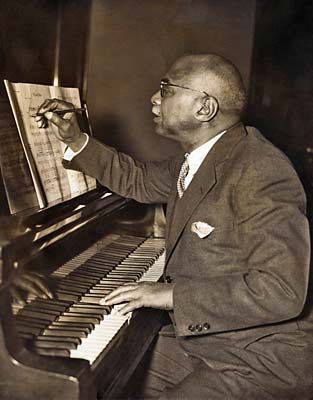
Jim Cullum. Photo by Jamie Karutz
More often than not the blues provide common ground for jam sessions at The Landing. On this edition of Riverwalk Jazz, the blues cover a lot of territory from the “C.C. Rider Blues,” a traditional blues that first surfaced in about 1908 to Duke Ellington's 1942 "C Jam Blues" to a Dick Hyman original called “Riverwalk Blues,” composed on the spot during this broadcast.
A formal definition of blues is a song 12 bars long divided into three parts of four bars each where the music—and often the lyrics—follow the form AAB. Songs of this type on today’s broadcast are: "Million Dollar Secret" sung by Stephanie Nakasian, "Incoherent Blues" by Clark Terry and "C. C. Rider Blues" played by Kenny Davern. Some numbers in this jam session do not follow this form but have a blues tonality through the use of ‘blue notes.’ One such example is the 1932 Arlen-Koheler song "I Gotta Right to Sing the Blues," played by trombone masters Dan Barrett, Bob Havens and Mike Pittsley. Another is the Bessie Smith classic "Muddy Water—A Mississippi Moan" from 1927, performed here in a moving rendition by Carol Woods. The great Benny Carter plays one of his original compositions called "Evening Star.” While not a formal blues, it has a smoky, blue mood.

W.C. Handy photo courtesy Riverwalk Jazz
Our show takes up the story of the blues in the early part of the 20th century, when William Christopher Handy—better known as W.C. Handy—was hanging out with his pals in a joint on Beale Street in Memphis called Pee Wee's Saloon. Handy earned his reputation as the "Father of the Blues," collecting and composing tunes that have been played and recorded hundreds of thousands of times in the decades since he first discovered or wrote them.

Carol Woods photo courtesy of the artist
Volumes have been written about the contribution W.C. Handy made to music with his blues. He was also a successful bandleader, cornetist and co-owner of a major music publishing house. Handy overcame blindness to write several books, including his autobiography, Father of the Blues. Throughout it all, he was an articulate spokesman for his race.
A highlight of this broadcast is a rare recording W.C. Handy made in the 1950s, talking about his first big hit, "Memphis Blues" which uses the 12-bar form, but in two different keys. In the background, there is a recording of Handy’s turn-of-the-century concert band performing “Memphis Blues” in a ragtime style.
“There's something about the 'Memphis Blues.' It didn't make as much money as the 'St. Louis Blues," but when I hear it, when I play it, smoke gets in my eyes. There’s something beautiful about it. Something deep in it.”
.jpg)
Benny Carter photo courtesy of the artist
King Oliver's Creole Jazz Band was the first significant black jazz band to be captured on recordings made during sessions in Indiana in 1923. Born on a Louisiana plantation in 1885, Joe Oliver went to New Orleans to work as a yard boy. There he learned to play cornet and worked with the famous Olympia Brass band, then formed his own band with clarinetist Sidney Bechet. He was a tough character, blind in one eye, and the story goes he would carry a gun to band rehearsals just to let everyone know he was the boss.
When Oliver arranged for the young Louis Armstrong to come up from New Orleans to play with his Creole Jazz Band on Chicago's South Side, he started to really make jazz history. On our show this week, guests Vince Giordano and violinist Andy Stein join The Jim Cullum Jazz Band to play a tune King Oliver and Louis Armstrong wrote together, called "Dippermouth Blues."
By the mid-1920s, jazz and blues came together to form a new popular music that swept the country. Hot jazz—some called it the ‘devil's music’—bubbled out of the black community, and was snapped up by a record-buying white mainstream audience. Racial lines slowly began to blur in a common appetite for classic blues and hot jazz. Jelly Roll Morton made what is widely considered the first interracial recordings in 1923 with the popular white band the New Orleans Rhythm Kings at the Gennett Studios in Richmond, Indiana.
Photo credit for Home Image: W. C. Handy photo courtesy Riverwalk Jazz
Text based on Riverwalk Jazz script by Margaret Moos Pick ©1992

